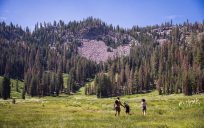
As an engagement practitioner, I find that people are often confused about the distinction between research, communications and public engagement. Of course clearing up this confusion often begins with knowing whether each field is seen by the audience as being distinct and separate or just one big mess of government stuff. And whether there is a marketing department involved.
Nevertheless, I have tried to explain the difference to many people. Citizens. Elected officials. Family. Friends. Engagement practitioners. Communicators. Researchers. People riding public transit. My neighbour. The dude at the corner store. And I haven’t been very successful. Because it seems that the more I say, the more confused they become. Which is frustrating for all concerned.
So about two or three years ago, I decided to take a more amiable approach to explaining the difference between the three disciplines. I did a silly little powerpoint presentation and shared it with some of my colleagues. And though this blog is lacking the photos, this is the heart of what I came up with.
Let’s pretend there are just three musical genres. Classical music. Popular – or pop – music. And jazz.
Now, come on, don’t start resisting me already. I did say, “let’s pretend”. Which is a useful phrase. Especially during budget discussions. But I digress.
Okay, so now that you have fully committed to a suspension of disbelief, you know that there are just three types of music. Classical. Pop. Jazz. Thank you.
Classical music is, “Serious music following long-established principles rather than a folk, jazz, or popular tradition.” I’m quoting from the online Oxford Dictionary. And I don’t remember how to reference an online quote, so I’m not going to. I’m on my lunch break. Buzz off with your demands.
Pop music is, “Music appealing to the popular taste, including rock and pop and also soul, reggae, rap, and dance music.” I know what you’re thinking. This is her second quote from the Oxford Dictionary. Isn’t it time for her to do the reference? Properly? And to that I say, whatever.
Jazz music is, “A type of music of black American origin which emerged at the beginning of the 20th century, characterized by improvisation, syncopation, and usually a regular or forceful rhythm.” Right. There you are. Again. Making your referency demands. Here. Go here. www.oxforddictionaries.com. You are a pain. What is this? A Congressional hearing? A Senate inquiry? An investigation of yet another Justin Bieber incident? Sheesh.
Consider research, communications, engagement, and their music counterparts.
Research is serious business. It follows long-established principles. When done well, it is a joy to listen to. It is thrilling to discover. And it conveys complex information in a way that can intrigue and delight. And confuse. As needed. Research is classical music.
Communications appeals to the popular taste. By necessity, it often has to reach large numbers of people. When done well, it is easy to listen to, easy to understand and a diverse audience might even embrace the message. Short skirt. Long jacket. Communications is pop music.
Public engagement is characterized by improvisation. The real power of public engagement – and the innovation of public engagement – is that a group of people can come together and can negotiate their agendas with each other. And that negotiation is the art. It teaches you that the world is big enough to accommodate us all.
Yes. I know.
I know I’m quoting the wonderful Wynton Marsalis who said this about jazz: “The real power of jazz—and the innovation of jazz—is that a group of people can come together and create art, improvised art, and can negotiate their agendas with each other. And that negotiation is the art.” And this, “It teaches you that the world is big enough to accommodate us all.” *
So, for those of you who are saying, jazz and the human experience, jazz and democracy – this is nothing new. You are right. However, as an imperfect being who loves to learn and make connections between art and my work, I can tell you that listening to Marsalis and reading his words was an ‘aha’ moment for me, the engagement practitioner. And I wanted to share it with you. I hope you like it. Thank you. And thank you, Mr. Marsalis.
* Not referenced. Not sourced. And, no, I’m not going to go look for it.
Tracy McCabe is part of the GovLoop Featured Blogger program, where we feature blog posts by government voices from all across the country (and world!). To see more Featured Blogger posts, click here.





Leave a Reply
You must be logged in to post a comment.